


Committed to Sustainable Cities and Human Settlements for All

In Special Consultative Status with ECOSOC
Search
NameDescriptionContent
Home>>Text
Trupti Amritwar Vaitla:Municipal GIS for Slum Upgrading in Mumbai, India Background
Source:
|
Author:gfhsforum
|
Published time: 2017-11-21
|
1749 Views
|
Share:

MESN CEO Ms. Trupti Amritwar Vaitla Spoke at SCAHSA Ceremony
Mumbai Environmental Social Network (MESN), founded by Mr. Ashok Datar and lead by Ms. Trupti Amritwar Vaitla, is an important Think Tank in the city of Mumbai working on various urban issues such as development of public spaces road based public transport, transport demand management, slum upgrading and solid waste management, etc.
MESN has been working with UN Habitat on various place-making initiatives in the poorest neighborhood, with citizen engagement, supported by UN Habitat which has received international recognition. The project of “Reimagining Public Spaces in Mumbai” of MESN, which had been awarded the “Global Human Settlements Award on Planning and Design” at the 2017 Sustainable Cities And Human Settlements Awards Ceremony on Oct 30 in New York, USA.
Background
Mumbai has a population of 12.44 million as per census 2011 and of which 5.2 million live in informal settlements. A survey by Indian National census clearly shows that improvements in the infrastructure facilities could not keep the pace, which is making these settlements have slum like conditions.
There is a need to improve the infrastructure in these settlements to improve livability and bring them out of slum conditions which lack security of tenure, adequate built up area per capita, access to water and sanitation and other social infra.
Municipal Corporation of greater Mumbai allocates huge amount of budget for slum improvement every year. Unfortunately, due to absence of any inventory and mapping of slum areas, it is very difficult to quantify improvements undertaken. Not a single slum since 1950 has been declassified in spite of huge money spent on upgrading to improve slum condition.
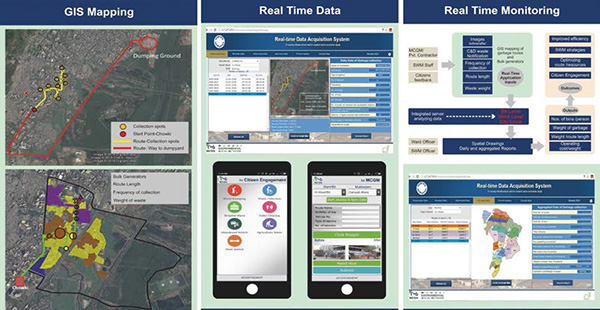
Digital Waste Management System
MESN has been advocating Municipal GIS system for city wide integrated development considering smart city and governance priority of the State and Central government. To upgrade the slums systematically, Municipal Corporation of greater Mumbai is undertaking GIS mapping of the slum areas at Macro and Micro level.
For GIS mapping, MESN has worked as a consultant with various ward offices in Mumbai. The work of slum mapping awarded is in fragmented way, more with the will of the local councilor who wants to upgrade slum in his ward. Also there is lack of understanding and will, to integrate the GIS mapping centrally which can help undertake upgrading in a phase-wise, systematic and holistic way and monitor its effective implementation.
MESN designed, Municipal GIS with an integrated approach (Supported by Riddhi Management services). This was designed not only for slum upgrading related accountability and transparency but could also be accessed by different departments (health, land, water supply, garbage disposal etc.) of the Municipal Corporation. It allows attaching spatial data and even uploading attribute data on a regular basis with a Citizen’s Interface for integrated governance.
The capacity of showing the detailed geospatial information of a municipality and analyzing performance in each area of activity makes Municipal GIS an unique tool for SMART Governance. Apart from showing the “As is” scenario of various infrastructures and uses, the system helps in evidence based planning, real-time data capture, updation, performance analysis and monitoring.
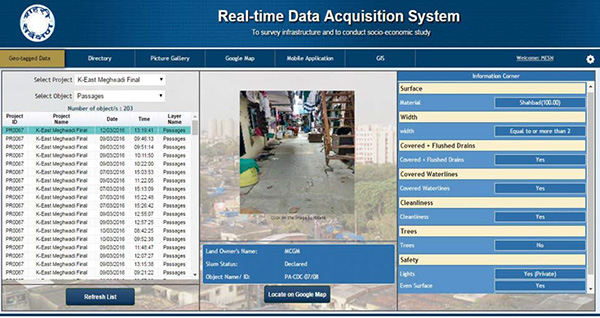
Real-time Data Acquisition System
This kind of mapping and monitoring mechanism used for slums will enable governments to make correct decisions in adopting various strategies and policies like relocation, redevelopment, upgrading or declassification of slum for slum free action plan.
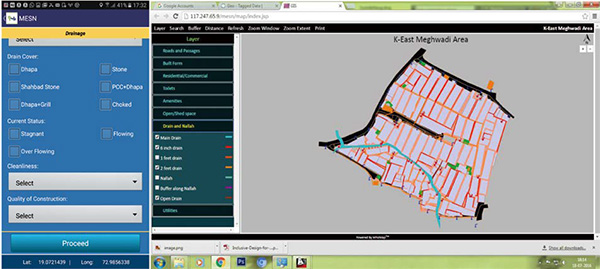
Mobile software for mapping slum infrastructure
National policies for the slum free action plan, are in support of in situ up - gradation of slums as the preferred option with no or minimum demolition of incremental housing. But State Government agencies believe that all slums are unfit for human habitation and slum redevelopment with FAR (Floor Area Ratio) incentives is the only way forward to eradicate slums and creating affordable housing. Unfortunately this approach has not only failed to create quality affordable housing but also to improve overall livability.
Municipal GIS will be necessary to classify slums ( based on parameters like security of tenure, adequate BUA per capita, access to safe water, sanitation and other social infra) . It will enable government to make more comprehensive and inclusive policies and strategy for slums like relocation, redevelopment, upgrading and declassification of slum for slum free action plan.
Establishment of Priorities for efficient Municipal GIS
1. To prioritize the slum upgrading work with Municipal GIS System;
2. To carry out implementation and monitoring of slum up-grading in a more integrated, professional and transparent manner with Municipal GIS system;
3. To enable government to make correct decisions in adopting various strategies and policies;
4. To integrate different departments of Municipal Corporation ( health, land, water supply, garbage disposal etc.) to attach their respective spatial data and attribute data;
5. To engage with citizens for inclusive, participatory governance.
Objectives and strategy for Municipal GIS
1. To generate real time quantitative and qualitative data with GIS mapping;
2. To create action plan based on condition analysis for slum upgrading;
3. To provide quick and universal access to web based GIS data from any computer/ mobile with internet service and a browser;
4. To create off-site public access to data and provide real time updates in public domain, anyone can validate the spatial/attribute data and send their feedback for necessary actions to ensure citizen engagement; All the above mentioned priorities, objectives and strategy for smart governance with GIS mapping is established by MESN in anticipation that, Municipal corporation will adopt Municipal GIS system for city wide integrated development.
Mobilization of resources
MESN has provided technical support as consultants to Municipal corporation and invested its own resource for developing Municipal GIS.
GIS and real time data is prepared by MESN which involves extensive site work, to generate quantitative and qualitative data with precise areas, measurements, finishes of public infrastructure like road, passages, drain, community toilets, open spaces etc along with its existing condition, liaising with ward office and other Govt. agencies, whereas integration of MIS and GIS on web is done from offsite office.
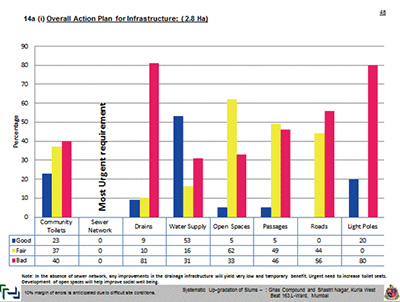
Rating of Infrastructure to measure improvements
The slum mapping at macro and micro level has helped in generating quantitative and qualitative data with precise areas, quantities, condition analysis with action plan for slums over 50 hectares. Municipal corporation has sanctioned budgets for few more projects and are currently under various stages of implementation, which will help to undertake upgrading work in a more integrated manner.
With the use of specially developed mobile application, MESN has been able to demonstrate how this application can be used effectively for participatory planning by involving local residents in the real time survey of mapping existing infrastructure condition. The mobile application has created accurate real time data base for slums spread over more than 50 hectares.
MESN has also developed web based GIS system by integrating real time data with detailed geospatial information for effective implementation and monitoring of slum upgrading for smart governance.
Other Projects developed by MESN
Public space development in slums with UN support
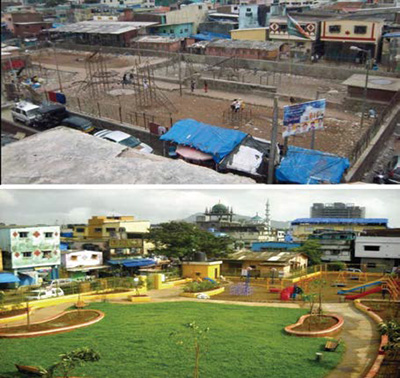
This 1300 sqm public space developed by MESN and UNHabitat with citizen engagement, serves over 200K people living in very small houses and has helped improve overall living environment.
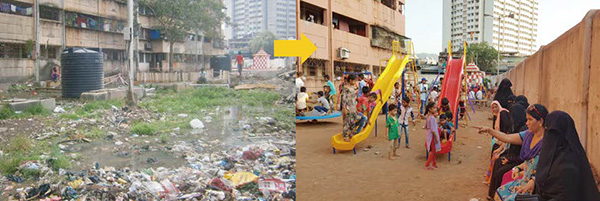
Many redeveloped slum colonies in Mumbai are in extremely poor condition, with 4500PPH density.
This pilot project has significantly improved the hygiene and use of public spaces but the upkeep in such ghettos of poverty is still a concern
Dedicated bus lane projects in Mumbai planned by MESN for development authority
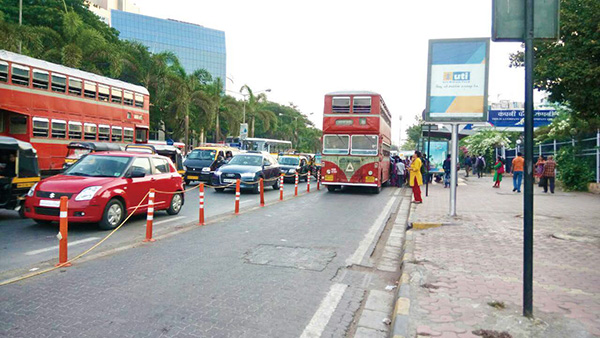
This pilot project in the new commercial center of Mumbai helped reduce travel time by half with bus lane carrying 180 buses (9800 passengers) /peak hr
Copyright © Global Forum on Human Settlements (GFHS)
